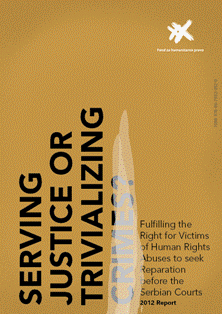FHP o suđenjima za odštetu: Dvostruko ponižavanje žrtve u Srbiji
Sorry, this entry is only available in srpski.

Sorry, this entry is only available in srpski.
Sorry, this entry is only available in srpski.
 ‘Education for Reconciliation’ is a film produced by the Humanitarian Law Center (HLC) on the Regional School for Transitional Justice, organized in January 2013, for 25 participants from Bosnia and Herzegovina, Kosovo and Serbia by HLC, HLC Kosovo and Association Pravnik from B&H. Participants attended a ten-day intensive programme on judicially established facts and war crimes trials, truth commissions, reparations for victims of violence, institutional reforms, roles of media and archives in post-conflict societal reconstruction, and other strategies to achieve reconciliation after a violent conflict. Among the lecturers at the School are most prominent regional experts on transitional justice, culture of memory, rule of law in post-conflict societies, etc. Film ‘Education for Reconciliation’ follows several students of the School, their impressions on the content of the lectures and personal changes they had undergone while being exposed to topics of the School.
‘Education for Reconciliation’ is a film produced by the Humanitarian Law Center (HLC) on the Regional School for Transitional Justice, organized in January 2013, for 25 participants from Bosnia and Herzegovina, Kosovo and Serbia by HLC, HLC Kosovo and Association Pravnik from B&H. Participants attended a ten-day intensive programme on judicially established facts and war crimes trials, truth commissions, reparations for victims of violence, institutional reforms, roles of media and archives in post-conflict societal reconstruction, and other strategies to achieve reconciliation after a violent conflict. Among the lecturers at the School are most prominent regional experts on transitional justice, culture of memory, rule of law in post-conflict societies, etc. Film ‘Education for Reconciliation’ follows several students of the School, their impressions on the content of the lectures and personal changes they had undergone while being exposed to topics of the School.
 This Report offers a review of 15 cases in which HLC represented victims and which resulted in court decisions in 2012. There were a total of 18 judgments, 12 of which were negative and six positive, which awarded a total of RSD 1.76 million to victims of human rights abuses.
This Report offers a review of 15 cases in which HLC represented victims and which resulted in court decisions in 2012. There were a total of 18 judgments, 12 of which were negative and six positive, which awarded a total of RSD 1.76 million to victims of human rights abuses.
Sorry, this entry is only available in srpski.
Sorry, this entry is only available in srpski.
 On Tuesday, June 4th, 2013, Nazmi Spahiu and Behxet Rrmoku, both victims of torture and unlawful detention, gave statements in the compensation lawsuit initiated by the Humanitarian Law Center (HLC) in April 2010 against the Republic of Serbia on account of the state’s responsibility for their torture in unlawful detention during 1999 and 2000. Nazmi Spahiu and Behxhet Rrmoku testified about the arrest and torture they experienced in prison, as well as about the consequences of the torture, from which they still suffer, and the long medical treatment they have had to undergo.
On Tuesday, June 4th, 2013, Nazmi Spahiu and Behxet Rrmoku, both victims of torture and unlawful detention, gave statements in the compensation lawsuit initiated by the Humanitarian Law Center (HLC) in April 2010 against the Republic of Serbia on account of the state’s responsibility for their torture in unlawful detention during 1999 and 2000. Nazmi Spahiu and Behxhet Rrmoku testified about the arrest and torture they experienced in prison, as well as about the consequences of the torture, from which they still suffer, and the long medical treatment they have had to undergo.
Sorry, this entry is only available in srpski.
When in May 1993 the UN Security Council passed a resolution to establish a tribunal to prosecute those responsible for serious breaches of international humanitarian law in the former Yugoslavia, Balkans watchers commonly saw it as a fig leaf for the unwillingness or inability of the West’s three permanent members to stop the carnage in Bosnia.